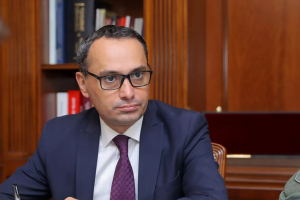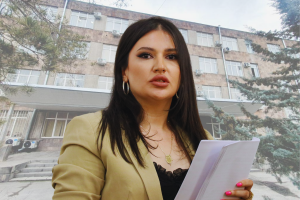On 30 March, the trial of Judge Arusyak Aleksanyan, her assistant Tamara Petrosyan and Lawyer Erik Aleksanyan continued in the Anti-Corruption Court.
On 17 October, 2022, the Supreme Judicial Council approved the petitions of the General Prosecutor’s Office regarding the initiation of criminal prosecution against Judge Arusyak Aleksanyan and consent to deprivation of liberty. Within the framework of the same case, the lawyer Erik Aleksanyan was also charged under Article 46-441 of the Criminal Code, that is, he assisted an official in abusing official powers or the influence caused by them or exceeding the powers. In the framework of this case, Arusyak Aleksanyan’s assistant Tamara Petrosyan was also charged.
The defendants do not accept the charges against them.
According to Iravaban.net, during today’s court session, Andranik Manukyan, the defense attorney of Arusyak Aleksanyan, who is in custody, presented a challenge motion to the presiding Judge Vahe Dolmazyan.
The petition was based on the decision of the Court of Appeals, by which the court rejected the complaint of the lawyers about the release of Arusyak Aleksanyan. According to Andranik Manukyan, in its court act, the Court of Appeals recorded that the claims that Vahe Dolmazyan, Judge of the Anti-Corruption Court during the discussion of the issue of arresting his client are not clearly unfounded and “when discussing the question of reasonable suspicion, he addressed it in depth and gave appropriate assessments, but it should have happened apparently.“
According to Andranik Manukyan, with this decision, although the Criminal Court of Appeals avoided directly recording that Vahe Dolmazyan violated the presumption of innocence of the defendant during the discussion of the issue of arresting Arusyak Aleksanyan, the above term is sufficient to record that the Court of Appeals agreed with the presumption of innocence of Aleksanyan to the allegations made by the appellants regarding of their being violated. “You violated the presumption of innocence of the accused Arusyak Aleksanyan during the discussion of the issue of arresting her.”
According to the lawyer, the Criminal Court of Appeals did not overturn Vahe Dolmazyan’s decision to detain simply on the grounds that the Anti-Corruption Court, at the session of 18 January, 2023, by mistake recorded that the period of detention of the accused had expired.
“If you had recorded, even by mistake, that Arusyak Aleksanyan was released from detention, and then you could not apply detention against the accused again, if there were no new essential circumstances justifying the necessity of detention. … In addition, the court limited Aleksanyan’s right to communication, without a procedural basis, on their own initiative, without having the appropriate petition of the Public Prosecutor,” Andranik Manukyan noted, adding that his client was detained in violation of the law.
Addressing the court, the lawyer noted that the judge cannot at least ensure the procedural requirement of “appearing impartial” and there is a reason for Vahe Dolmazyan to submit self-recusal.
According to Arusyak Aleksanyan, he joins the petition “with all his heart and soul”. “Please, submit a self-recusal finally and let another Judge examine this case, because if my defense says that you do not seem impartial, you are not impartial to me as well.”
Other participants in the trial, except the accuser, joined the petition. Defendant Erik Aleksanyan stated in the court that he is not sure whether the court will formally avoid such wording from now on, or will maintain its internal conviction by using milder wording in judicial acts. “I have no confidence that after formally providing those circumstances, you will have the conviction that it is still too early to draw conclusions about guilt or innocence.”
Judge Vahe Dolmazyan asked questions to the defendants’ lawyers. According to him, “degree of depth” is a subjective perception and different people understand it differently, including the Court of Appeals. However, at the same time, according to the court act, no violation of the presumption of innocence was recorded.
According to Andranik Manukyan, the Criminal Court of Appeal, by not indirectly registering the violation of the presumption of innocence of Arusyak Aleksanyan protected itself from possible negative consequences. “I believe that the Criminal Court of Appeal renamed my client’s “violation of the presumption of innocence” with the term “in-depth reference to reasonable doubt”.
The court also had a question for Arusyak Aleksanyan’s other lawyer, Yerem Sargsyan. “If there is a case that contains certain information, part of it is based on certain facts; the other part is based on estimates. On the basis of all that, there are formulations, volume of evidence, due to which accusations were made. If the court recorded those wordings, did it thereby confirm that the “wordings” were confirmed?
The lawyer stated that the problem is that the presiding judge not only considered the “formulations” of the accusation to be confirmed, but made them with an internal, subjective perception. Prosecutor Armen Gevorgyan stated that the defense filed a motion for recusal as a result of a subjective interpretation of the decision of the Court of Appeal.
“Such subjective interpretations are also evidenced by the fact that the defense made such notes that refer to the limits of judicial control. . . . According to the logic of the defense, the judge of the Court of Appeal was also biased because, according to their impression, a wrong interpretation was given to certain provisions of the Criminal Procedure Code,” the Prosecutor noted, adding that the estimates of the defense side are exaggerated.
Andranik Manukyan tried to counter Armen Gevorgyan’s statement, but the court did not allow it. The lawyer said on that occasion: “I see that your attitude changed after my appeal. I am sorry for that, but there is no need to change, Mr. Dolmazyan.
The judge mentioned that the formed impression is wrong and urged to get permission before making a statement in the session hall. The court found that there is no need to reverse, because conducting a petition examination in such a format can last indefinitely.
Vahe Dolmazyan stated that the records of the Court of Appeals or annulled decisions cannot be a basis for self-recusal of a judge, because otherwise, in case of annulment of each act by the higher court, the judge of the lower court should submit self-recusal. “The court finds that this issue has already been discussed. A written petition for a challenge was presented to the judge with the mentioned reasoning.
The court also found that the records made by the Court of Appeals cannot be evaluated as new essential arguments and left the petition of Arusyak Aleksanyan’s defenders without examination
The prosecutor then presented a list of written evidence and suggested to first examine the written evidence, then questioning the witnesses, and finally the defendants. Andranik Manukyan stated that first examining the written evidence and then only listening to the witnesses, serves one purpose: to extend Arusyak Aleksanyan’s detention period as much as possible.
However, the prosecutor noted that the prosecution does not take any action without reason and at the expense of the freedom of the accused. “Another issue is due to what subject of the trial or what kind of process the constant delays in the freedom of the accused continue. In addition, the prosecution proceeds from the presumption that the examination of written documents is necessary first of all to create preconditions for proper questioning of witnesses, and then for proper questioning of the accused.”
This time, the Judge allowed Andranik Manukyan to respond to the statement of the Prosecutor. The lawyer noted that the Criminal Procedure Code does not prohibit the witness from being questioned several times in court. He proposed to first question the witnesses and then examine the documents. “The prosecution seeks the given sequence of evidence examination in order to justify the detention of Arusyak Aleksanyan. We all understand that if the witnesses are interrogated before the examination of the issue of extension of the detention period, then it will be very difficult for you to justify that Arusyak Aleksanyan can hinder the process of proof.
Then Arusyak Aleksanyan expressed her position.
“Mr. Gevorgyan, did I understand correctly? You say that in order to make it clearer, to understand what the entire proceedings are about, let’s first study the documents of the proceedings, and then listen to the witnesses. In other words, do we not understand what we are talking about? They must be studied, examined, the internal observations must be seen, looked at, and then we must understand what the witnesses are saying. You also said whether the prosecution has a fault that the trial is being delayed so much? If it is not the fault of that subject, then whose fault is it? Is it the fault of the Court that sets the hearing a month later and then goes on vacation? Is it my fault that any state body does not organize its actions and activities in such a way that my right to freedom is not violated so much? That is all,” the defendant said.
The prosecutor assured Arusyak Aleksanyan that the measure of restraint chosen against her, that is, continuous detention, has nothing to do with the actions of the prosecution.
Erik Aleksanyan also asked for time to present his questions and position regarding the written evidence.
The court hearing was postponed and scheduled for 7 April.
Yevgenya Hambardzumyan

















